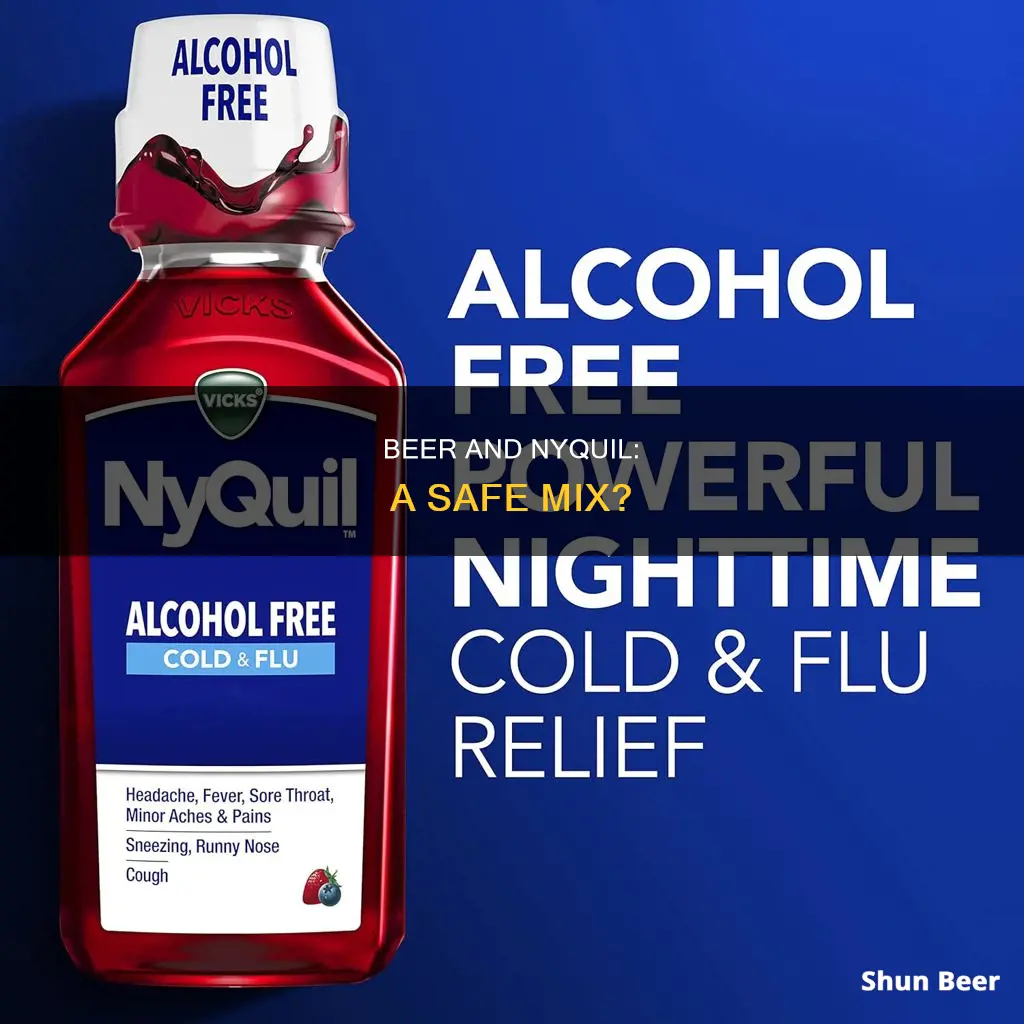
Drinking alcohol while taking NyQuil is not recommended, as it can worsen side effects such as drowsiness and dizziness, and may even lead to liver damage. NyQuil contains acetaminophen, which is also found in medications like Tylenol, and mixing it with alcohol can put additional stress on the liver, increasing the risk of liver damage. Dextromethorphan (DXM), another ingredient in NyQuil, can cause similar effects to alcohol, including hallucinations, when consumed in higher doses. Therefore, combining DXM with alcohol can lead to dangerous side effects such as shallow breathing, stupor, coma, and even death. Doxylamine succinate, an antihistamine in NyQuil, can also cause extreme sleepiness and dizziness, and when mixed with alcohol, can lead to dangerous levels of sedation. While the liquid form of NyQuil contains 10% alcohol, it is still recommended to avoid consuming additional alcohol while taking NyQuil to prevent negative side effects and potential health risks.
| Characteristics | Values |
|---|---|
| Should you drink a beer and take Nyquil? | No |
| Why? | The combination of Nyquil and beer can cause excessive drowsiness and impaired alertness. It can also lead to liver damage. |
| Nyquil ingredients | Acetaminophen, Dextromethorphan (DXM), Doxylamine succinate |
| Beer ingredients | Water, Barley, Hops, Yeast |
What You'll Learn
- Nyquil contains 10% alcohol
- Nyquil has several active ingredients, including acetaminophen, dextromethorphan, and doxylamine succinate
- Mixing alcohol and Nyquil can cause liver damage
- Combining alcohol with Nyquil can increase side effects like drowsiness and dizziness
- If you've mixed Nyquil and alcohol, avoid more alcohol and seek medical treatment if you've had more than a few drinks

Nyquil contains 10% alcohol
Nyquil is an over-the-counter medication that helps relieve symptoms associated with colds and the flu, such as coughs, runny noses, and aches and pains. It is available in liquid form and as liquid capsules.
The liquid form of Nyquil contains 10% alcohol, which is used to dissolve the active ingredients. This is equivalent to around a sip or two of wine per recommended dose. However, the manufacturer, Vicks, warns against consuming alcohol while taking Nyquil, even if you are using an alcohol-free version. This is because Nyquil can cause drowsiness, which alcohol may worsen.
The active ingredients in Nyquil include acetaminophen, dextromethorphan, and doxylamine succinate. Both alcohol and acetaminophen are broken down by the liver, and consuming too much of either can lead to liver damage. Dextromethorphan is a cough suppressant, and when mixed with alcohol, can cause dizziness, drowsiness, nausea, and vomiting. Doxylamine succinate is an antihistamine that causes drowsiness, and when combined with alcohol, can lead to a dangerous level of sedation.
Therefore, while Nyquil contains a small amount of alcohol, it is not recommended to consume additional alcohol while taking this medication due to the potential side effects and health risks.
Dayquil and Beer: A Safe Mix?
You may want to see also

Nyquil has several active ingredients, including acetaminophen, dextromethorphan, and doxylamine succinate
Acetaminophen, a drug that eases pain and reduces fever, is one of the key ingredients in Nyquil. It is also commonly found in other over-the-counter medications like Tylenol. Both alcohol and acetaminophen are metabolized by the liver, and combining them can put extra stress on this organ, potentially leading to liver damage. While taking the recommended dose of acetaminophen and having a few drinks occasionally may not cause liver problems, heavy alcohol use (three or more drinks per day) and repeated acetaminophen use can lead to severe liver damage.
Dextromethorphan (DXM), another active ingredient in Nyquil, acts as a cough suppressant. When taken as directed, it is safe and effective. However, when combined with alcohol, DXM can cause side effects such as dizziness, lightheadedness, drowsiness, nausea, and vomiting. In higher doses, DXM can even lead to hallucinations and loss of motor coordination. Recreational abuse of DXM by adolescents and teens has become an increasing concern, with approximately 3% of 8th, 10th, and 12th graders reporting abuse of cough medicines to get high.
Doxylamine succinate, an antihistamine in Nyquil, helps with a runny nose and sneezing. It is also the component that makes you sleepy. When combined with alcohol, a depressant with sedative effects, doxylamine succinate can lead to dangerous levels of sedation. This combination may also result in slowed breathing, impaired motor control, unusual behaviour, and memory problems.
While the liquid form of Nyquil contains 10% alcohol, which is similar to the alcohol content in white wine, the recommended dose of Nyquil is much smaller than a typical glass of wine. Therefore, the amount of alcohol consumed from a regular dose of Nyquil is equivalent to a sip or two of wine. However, consuming larger amounts of alcohol while taking Nyquil can have dangerous consequences.
Short-term side effects of mixing alcohol and Nyquil include increased drowsiness, increased heart rate, digestive distress (nausea, vomiting, or diarrhoea), and irritability or agitation. Repeatedly mixing alcohol and Nyquil can eventually lead to liver damage due to the presence of acetaminophen in Nyquil.
Beer and Diarrhea: What You Need to Know
You may want to see also

Mixing alcohol and Nyquil can cause liver damage
Mixing alcohol and Nyquil can have serious adverse health effects, including liver damage. This is because Nyquil contains acetaminophen, the active ingredient in Tylenol, which is broken down (metabolised) by the liver, as is alcohol. Taking the recommended dose of acetaminophen and having a few drinks once in a while won't typically lead to liver problems. However, heavy alcohol use (three or more drinks a day) and repeated acetaminophen use can lead to liver damage.
Acetaminophen is a popular pain reliever and fever reducer found in more than 600 medications. Acetaminophen overdose is the leading cause of acute liver failure in the United States, with over 78,000 people ending up in the emergency room each year due to acetaminophen overdoses. Combining alcohol with acetaminophen increases the risk of problems in the digestive system, such as nausea, stomach pain, and yellow skin, which could indicate liver injury.
The danger lies in the way the body breaks down acetaminophen. When metabolised, it produces several byproducts, including a toxic substance called NAPQI, which is highly toxic to the liver. Usually, the liver produces an antioxidant called glutathione that neutralises NAPQI and prevents it from damaging liver cells. However, heavy drinking reduces glutathione levels, allowing NAPQI to harm the liver.
Procter & Gamble, the manufacturer of Nyquil, warns on its website that severe liver damage may occur if you drink three or more alcoholic beverages while taking Nyquil. Therefore, it is crucial to avoid mixing alcohol and Nyquil to prevent potential liver damage and other harmful side effects.
Dialysis and Alcohol: Is Beer Safe for Dialysis Patients?
You may want to see also

Combining alcohol with Nyquil can increase side effects like drowsiness and dizziness
Nyquil contains three active ingredients: acetaminophen, dextromethorphan (DXM), and doxylamine succinate. Acetaminophen is a pain reliever and fever reducer, while DXM is a cough suppressant. Doxylamine succinate is an antihistamine that helps with a runny nose and sneezing and also causes drowsiness.
When combined with alcohol, the side effects of these ingredients can be amplified. Both alcohol and acetaminophen are metabolized by the liver, and combining the two can lead to liver damage. Heavy alcohol use and repeated acetaminophen use can increase the risk of liver damage. Additionally, alcohol can enhance the effects of DXM, leading to increased drowsiness and dizziness. In higher doses, DXM can cause hallucinations, and mixing it with alcohol can be extremely dangerous and even life-threatening.
Doxylamine succinate is also a depressant, like alcohol, and combining the two can lead to dangerous levels of sedation. This can result in slowed heart rate and breathing, impaired motor control, unusual behaviour, and memory problems.
While a single occurrence of mixing Nyquil and alcohol may not cause severe side effects, frequent mixing can lead to liver damage and other serious medical issues. Therefore, it is recommended to avoid consuming alcohol while taking Nyquil to lower the risk of unpleasant and potentially harmful side effects.
The Magic of Mr. Beer Kit: Brewing Simplified
You may want to see also

If you've mixed Nyquil and alcohol, avoid more alcohol and seek medical treatment if you've had more than a few drinks
If you've mixed Nyquil and alcohol, it's important to avoid consuming more alcohol. This will help lower your risk of experiencing unpleasant side effects or serious complications. While one or two drinks may not be a cause for concern, it's best to seek medical treatment if you've had more than a few drinks.
The combination of Nyquil and alcohol can lead to enhanced sedative effects, impaired cognitive function, and an increased risk of liver damage due to the presence of acetaminophen in Nyquil. Alcohol enhances the effects of the active ingredients in Nyquil, leading to potentially harmful consequences.
If you experience any severe symptoms, such as intense drowsiness, nausea, vomiting, or irritability, it's important to seek emergency medical treatment. Additionally, if you find it difficult to refrain from mixing Nyquil and alcohol or notice a pattern of using these substances together, it may indicate a developing substance use disorder, and seeking professional help is advised.
Vintage Beer: Drinking Beer from 1996 and Beyond
You may want to see also
Frequently asked questions
No, you should avoid drinking alcohol while taking NyQuil. Both alcohol and NyQuil are broken down by the liver, and combining the two can cause additional stress on your liver, leading to potential liver damage.
Alcohol can enhance the effects of the active ingredients in NyQuil, leading to harmful consequences. For example, it can increase side effects like drowsiness and dizziness, and in some cases, it could lead to liver damage.
Short-term side effects of mixing NyQuil and alcohol include increased drowsiness, increased heart rate, loss of coordination and balance, and digestive issues such as nausea, vomiting, or diarrhea.
Frequent mixing of NyQuil and alcohol can cause liver damage and other serious medical issues due to the additional stress placed on the liver.
If you've already mixed NyQuil and alcohol, avoid consuming more alcohol. If you've had one or two drinks, there is usually no need for concern. However, if you've consumed more, it is recommended to seek medical treatment.







